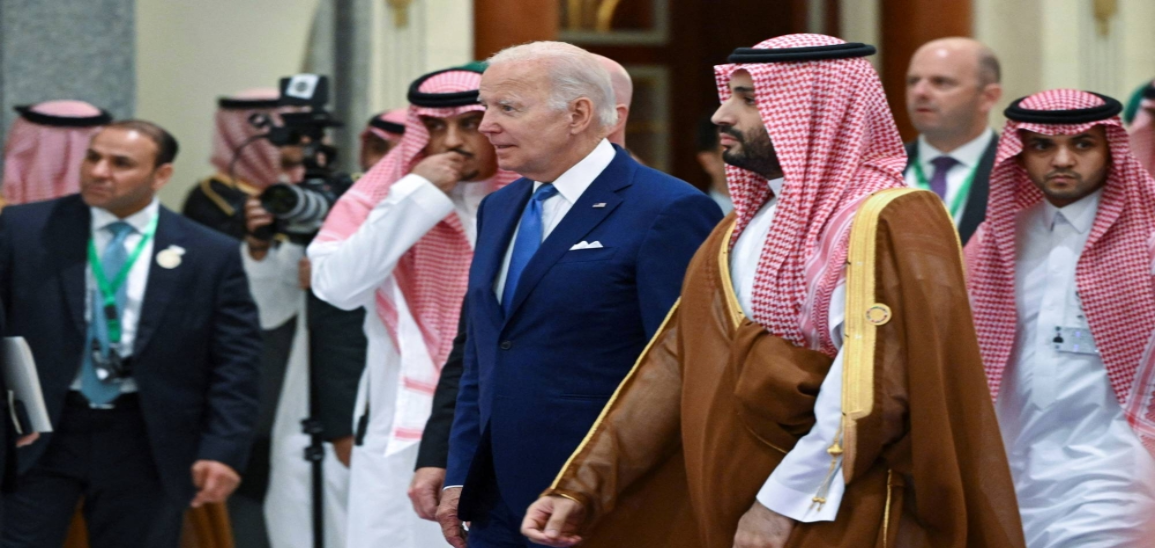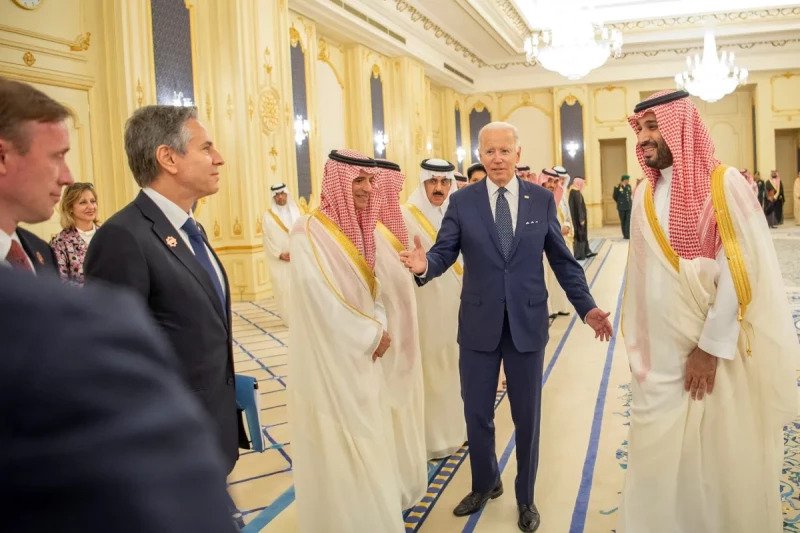Israeli-Saudi Arabia: Burying the Hatchet
September 30, 2023 | Expert Insights

As the guardian of the Umma, the entire Muslim world looks up to the Kingdom of Saud for guidance on matters that impact Muslims across the globe. In that context, the vexing issue of Palestine has been a major concern for successive Saudi rulers, making any rapprochement with Israel a difficult hurdle to cross.
However, nearly 70 years after the creation of Israel from within the womb of Arabian land, there are signs that Israel and Saudi may be moving towards a rapprochement. This would be a significant development, potentially reshaping the Middle East's political landscape. This has been driven by several factors, including shared concerns about Iran's nuclear program and regional instability.
However, all is not smooth going as the two-nation theory acceptable to Arab nations for Palestine and their deeply embedded domestic sentiments for the plight of the Palestinians remain serious obstacles to any meaningful relations between Tel Aviv and Riyadh.
In addition, there are spoilers, like Iran, who, in July 2023, warned that a rapprochement between Saudi Arabia and Israel would harm regional peace.
Tangibility of the Rapprochement
The growing threat from Iran is one of the most important factors driving Israeli-Saudi rapprochement. Both Israel and Saudi Arabia believe that Iran is seeking to develop nuclear weapons and supporting regional militias destabilising the Middle East.
The Iran nuclear issue was to be resolved by the 2015 Joint Comprehensive Plan of Action (JCPOA) between Iran and the P5+1(the United States, the United Kingdom, France, Russia, China, and Germany. The JCPOA placed restrictions on Iran's nuclear program in exchange for the lifting of sanctions and its return to the international community. Israel was the most strident opponent of JCPOA. When President Trump unilaterally walked out of it, in effect scrapping it, both Israel and Saudi Arabia welcomed the move, showing a surprising commonality in interests. However, with JOCAP no longer a restrictive factor, both Riyadh and Tel Aviv also agreed that the risk of Iran going nuclear had been aggravated.
The changing dynamics of the Middle East is another important factor driving Israeli-Saudi rapprochement. The Arab Spring and the rise of ISIS have led to a more complex and unstable region. In this environment, Israel and Saudi Arabia have found common interests in maintaining stability and combating extremism. Both Israel and Saudi Arabia are concerned about the growing influence of Iran in the region. Iran has been supporting Shia militias in Iraq, Syria, Lebanon, and Yemen to counter the Sunni forces supported by Saudi Arabia and its Gulf allies in these countries.
Another area of concern shared by both Israel and Saudi Arabia is the rise of the Muslim Brotherhood, which is receiving a boost with the rise of Turkey. Ankara has been supporting the Muslim Brotherhood, a Sunni Islamist movement opposed by Saudi Arabia.
Economic factors are also playing a role in driving Israeli-Saudi rapprochement. Both countries are interested in expanding their trade and investment ties. Israel is a leader in technology and innovation, while Saudi Arabia is a wealthy country with a large market and deep pockets looking at diversifying its oil-based industry.
In 2021, Israel and Saudi Arabia signed a trade agreement worth $1 billion. The agreement covers a range of sectors, including healthcare, agriculture, and technology. In addition to the economic benefits, Israeli and Saudi officials believe that rapprochement would also enhance their security. Both countries believe they would be stronger if they were working together to face the threats posed by Iran and other regional actors.

Analysis
Despite these driving factors, there are also several obstacles to Israeli-Saudi rapprochement. The Palestinian issue is the most significant hurdle, being highly emotive and divisive and a major source of tension in the Middle East. The Palestinians seek to establish an independent state in the West Bank and Gaza Strip, with East Jerusalem as its capital. On the other hand, Israel claims the entire territory of Jerusalem as its capital and has built settlements in the West Bank, which are considered illegal under international law.
The Palestinians and Israelis have been engaged in peace negotiations for decades, but they have failed to reach a comprehensive agreement. The most recent round of peace talks collapsed in 2014. The Palestinian issue is a complex and intractable problem and is unlikely to be resolved anytime soon. This means that it will likely continue to be a major obstacle to Saudi-Israeli rapprochement.
Saudi Arabia has long supported the Palestinian cause, and it is unlikely to normalise relations with Israel until a just and lasting resolution exists. Palestine remains a sensitive issue in domestic Saudi politics, something no Saudi ruler would like to tinker with unless the results include tangible benefits for the Palestinians that are acceptable to the Saudi people.
There are strong orthodox constituencies in Israel and Saudi Arabia who would oppose any close relations and fight tooth and nail against any deal made surreptitiously or under Western pressure. This includes religious conservatives, nationalists, and human rights activists. The Palestinian issue is very important for many Saudis, and they are unlikely to support any move they see as abandoning the Palestinians.
Some Israelis believe normalising relations with Saudi Arabia would send the wrong message and undermine Israel's commitment to democracy and human rights. Domestic opposition to normalisation in Saudi Arabia and Israel is a significant obstacle to rapprochement. It is unlikely that either country will normalise relations until there is a change in public opinion.
Many Islamic countries like Pakistan, sitting on the fence, are caught on the horns of a dilemma; they cannot afford to annoy Riyadh if it signals those more Islamic countries, especially the leading ones, join it in recognising the state of Israel. Concurrently, their domestic compulsions make it politically highly risky to mend fences with Israel, a state that has been a rallying point for diverting public anger and frustration by successive governments.
Assessment
- A Saudi-Israeli rapprochement would have a number of effects on the Middle East. First, it would help to reduce tensions and instability in the region. Second, it would create new opportunities for trade and investment. Third, it would strengthen the ability of the two countries to cooperate on common threats, such as terrorism and extremism.
- A Saudi-Israeli rapprochement would also send a positive message to the rest of the Middle East. It would show that even the most difficult conflicts can be resolved through diplomacy and dialogue. However, whether it will unite the Islamic world or create serious fissures cannot be predicted at this juncture.
- Overall, the ramifications of a Saudi-Israeli rapprochement are mixed. It would have some positive benefits, but it would also have some potential negative consequences. It is important to consider all the implications before progressing with a rapprochement.








Comments